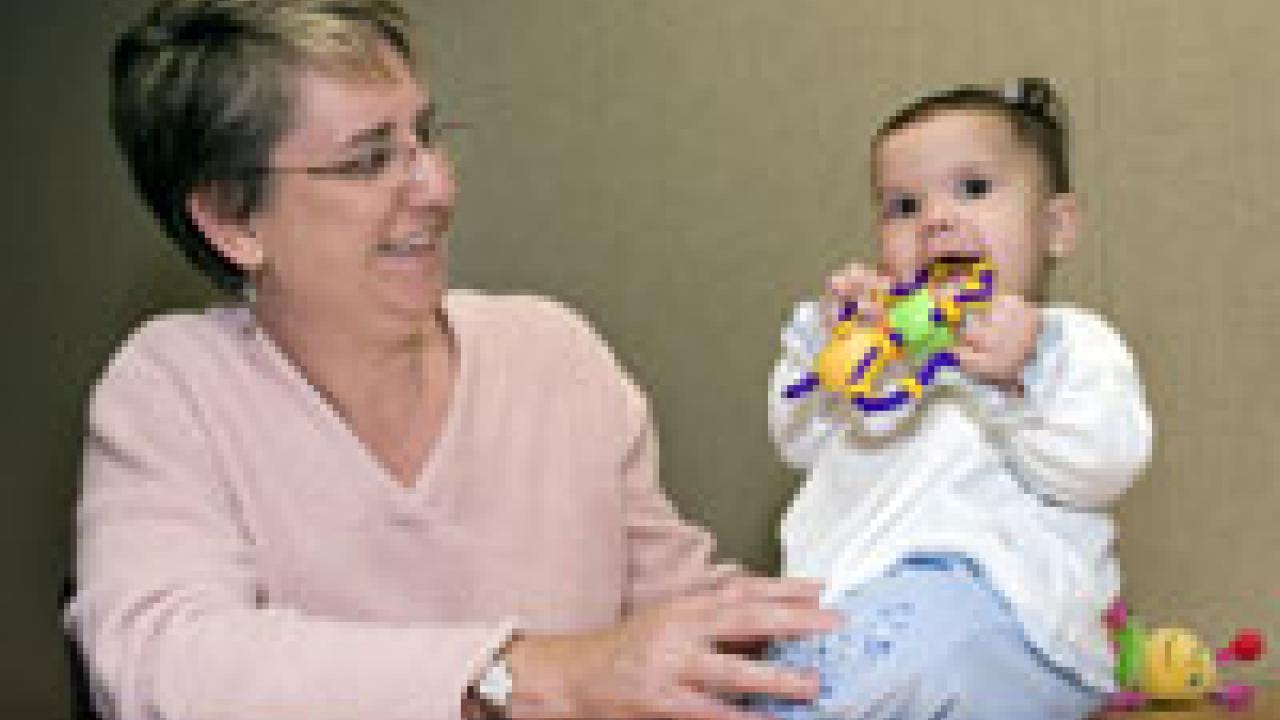Babies are incredibly brainy, but what and how they think is in a category all its own, said UC Davis psychology professor Lisa Oakes.
Oakes, a developmental scientist with the UC Davis Center for Mind and Brain, has spent her career figuring out how these young humans think before they have developed the words to describe what they are processing.
"Babies are really smart, but in a 'baby way' — they are not mini-adults," she said.
"We have found babies can't remember as many things as we can and that they can't divide their attention as well as adults," Oakes said.
But, at the same time, her research has revealed that babies do learn a lot about the world around them.
Oakes, and her husband, Steve Luck, a fellow cognitive neuroscientist with the UC Davis Department of Psychology and its major research unit, the Center for Mind and Brain, arrived last summer from the University of Iowa, attracted by the growing reputation of campus for their type of research. They live in Davis where they are raising their two children — 4-year-old son Carter and 7-year-old daughter Alison.
Oakes has made headway in her 15-year research career in proving her theories with the help of 4-to-10-month-old infants who are given tasks to interpret what they see. In a typical experiment, a baby will watch a video of a simple activity while Oakes' researchers document the infant's reactions.
In a recent series of experiments conducted while at the University of Iowa, 10-month-old infants watched videos in which they saw an object on a screen and heard a sound produced when a hand squeezed the object.
Oakes and her graduate student, Sammy Perone, wanted to find out whether babies were learning about how objects function from the actions and sounds produced.
"This study of actions on objects with outcomes found babies make different kinds of inferences — that is, they are not asking how things react but what can you do with things," Oakes said, explaining that these pre-verbal babies quickly understood the obvious action on the object — the hand squeezing it — but had more problems understanding that the action resulted in a particular outcome — the squeak.
For parents, this finding has implications for choosing baby toys. Oakes suggests that it is not necessary for parents to provide sophisticated toys with a variety of buttons that create different sounds or other effects when pushed.
"The variety doesn't matter to babies," she said. "They like pushing the buttons — it's the action, not the outcome."
In her research, Oakes is also looking at how babies categorize what they experience from the time they are born — without words.
"Categorization is what the mind does," she said. "To learn categories is the fundamental way that the mind deals with too much information. Once babies start to learn words, they have placeholders for those categories. This can help conserve that mental energy."
Oakes' research shows that one big difference for pre-verbal infants is that they have limited memory, attention and knowledge that narrow their focus.
"Infants can learn categories," she said, "but they use different strategies and might group objects differently — like paying attention to the action you can perform on objects rather than paying attention to what happens when you act on an object."
When infants begin to use language, they adopt nouns before they use verbs, since nouns represent the more obvious "what" that they have been exploring so intently; by contrast, verbs are often non-obvious actions. For example, babies learn "ball" and "cup" before they learn "throw" and "drink."
Given her findings about how babies are thinking before they have developed language, Oakes has her own opinions about "teaching" babies to read.
"It's really good thing to have that one-on-one closeness and to teach your baby to learn to love books as objects — and you are exposing them to words," Oakes said. "But they won't see the same things in pictures that you do and — even with evidence that they understand the words — we can't know that the baby understands the words the same way as we do."
After 15 years in Iowa, where Oakes had developed a network for finding research subjects in her community, she finds she is starting all over again in Davis. She is hoping that local parents will be as fascinated as she is in learning more about how babies think and interested in contributing to her research.
Parents with infants who might be interested in participating in the research can contact Oakes at lmoakes@ucdavis.edu or at (530) 297-4416.
Media Resources
Susanne Rockwell, Web and new media editor, (530) 752-2542, sgrockwell@ucdavis.edu
